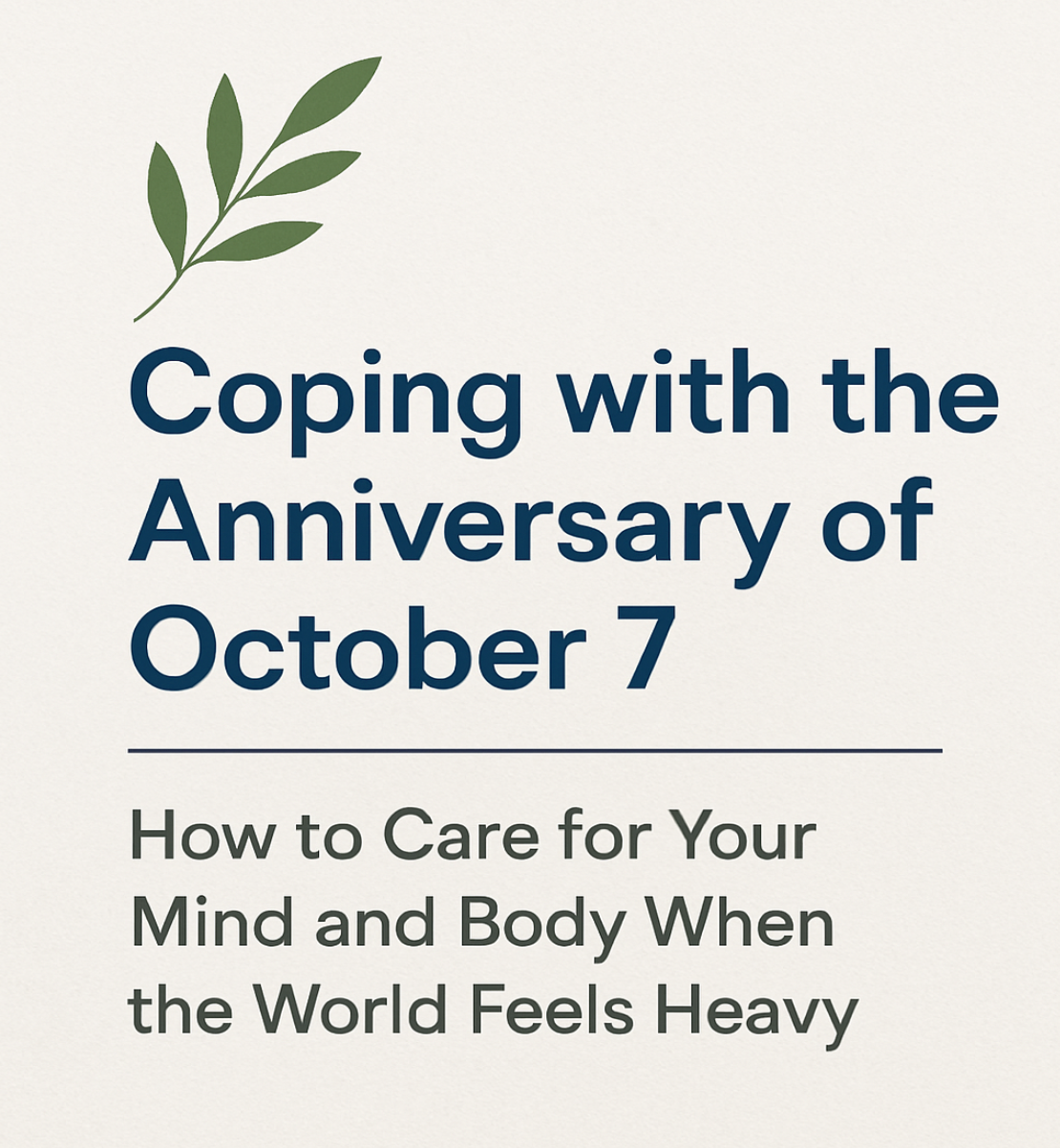As another October 7 approaches, many people notice a quiet heaviness settling in, even before they realize why.
For those directly or indirectly affected by the violence of that day, the anniversary can bring grief, fear, anger, and exhaustion.
Even for those not personally impacted, witnessing ongoing suffering in the world can awaken collective grief and a sense of helplessness.
These experiences are what therapists call anniversary reactions: emotional or physical responses that resurface around the date of a traumatic or tragic event. They’re a natural part of how trauma lives in the body and nervous system. Even if we’re not consciously aware of the date, our bodies often remember. You might find yourself feeling on edge, tearful, restless, or emotionally numb without realizing why.
Why the Body Remembers
Trauma imprints not only as a story in our minds, but as a physiological pattern in the body.
When an anniversary approaches, familiar cues (the time of year, the news cycle, or even the quality of light outside) can unconsciously trigger that pattern. The nervous system shifts back toward a stress response, even if there’s no immediate danger.
Recognizing this is powerful. It reminds us that what we’re feeling isn’t “crazy” or “too sensitive”. It’s our body’s way of trying to protect us.
How to Cope Ahead: Preparing Emotionally for Difficult Days
One psychotherapy tool I often share with clients is “Cope Ahead,” a skill from Dialectical Behavior Therapy (DBT).
Think of it like practicing how to change a spare tire before you’re stranded on the side of the road.
You can’t prevent every bump or detour, but you can learn what to do when it happens, and that preparation can make the difference between panic and steadiness.
To “cope ahead,” ask yourself:
-
What emotions might come up for me this week?
-
How do I usually respond when I feel that way?
-
What coping strategies help me calm or ground myself?
-
Who could I reach out to if I start to feel overwhelmed?
Even small steps like scheduling a therapy session, planning quiet time, limiting exposure to distressing news can help you move through the day with more control and care.
Grounding in the Present Moment
When emotions surge, grounding helps anchor you back to the present.
Try a simple 5-4-3-2-1 exercise:
-
5 things you can see
-
4 things you can touch
-
3 things you can hear
-
2 things you can smell
-
1 thing you can taste
This sensory check-in helps remind your nervous system that even though your body feels scared, you’re safe right now.
Connection Is Healing
Trauma isolates. Healing reconnects. If this anniversary feels heavy, consider reaching out to a friend, a faith community, or a therapist. You don’t have to talk about the trauma itself to feel the benefit of connection.
Sometimes, just being with others who help you feel seen and grounded can soften the loneliness that grief creates. In the DC area, there will be an evening of remembrance.
Practice Self-Compassion
You don’t need to “perform” strength or know the perfect words. However you move through this day is okay. If you feel drained, distracted, or emotional, that’s your nervous system asking for gentleness. Ask yourself what words or gestures of compassion you’d offer to someone you love. Then offer that same compassion to yourself.
Rituals That Bring Meaning
Rituals give shape to remembrance. They don’t have to be large or public. Sometimes lighting a candle, journaling, or taking a quiet walk can bring grounding and connection. Rituals help transform pain into purpose, giving us a way to hold memory while also caring for ourselves in the present.
Moving Forward with Compassion
If October 7 brings up emotion for you, remember: you’re not alone, and there’s nothing wrong with you for feeling deeply. Our nervous systems hold both our pain and our capacity for resilience.
By coping ahead, grounding, connecting, and practicing self-compassion, we make space not only for grief, but also for healing.
Wishing you steadiness, connection, and care this week.

